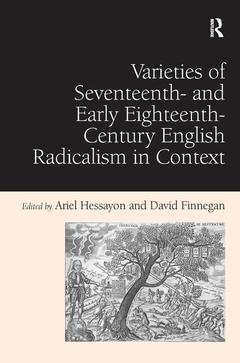Varieties of Seventeenth- and Early Eighteenth-Century English Radicalism in Context
Auteur : Finnegan David
Coordonnateur : Hessayon Ariel

Date de parution : 05-2011
15.6x23.4 cm
Date de parution : 06-2019
15.6x23.4 cm
Thèmes de Varieties of Seventeenth- and Early Eighteenth-Century... :
Mots-clés :
Cosimo III; Giovanni Tarantino; Pope Paul III; Jason Mcelligott; Leveller Leader John Lilburne; Jason Peacey; William King; Jim Smyth; Abiezer Coppe; Mario Caricchio; Coppe’s Text; Nicholas Mcdowell; Maiolino Bisaccioni; Noam Flinker; Fiery Flying Roll; Sandra Hynes; Hendrick Niclaes; Sarah Hutton; Civil War Radicalism; Stefano Villani; Early Modern Print Culture; Warren Johnston; Judaic Materials; St George’s Hill; Cambridge Platonists; Sweet Sips; Act III; William III; Sir Roger Twysden; English Radical Movements; Joseph Boyse; Seventeenth Century Italian; Sunday Sabbath; Ralph Thoresby; General Baptist; Hermeneutic Journey



